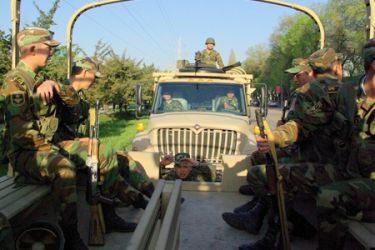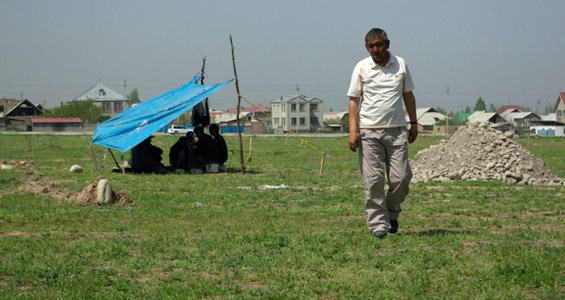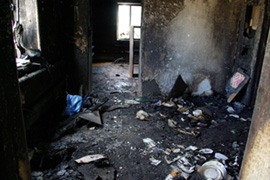Kyrgyzstan’s hollow revolution
Hard times may lie ahead as interim government seeks to provide security.

 |
| Squatters have moved onto privately owned farmland outside Bishkek [Tolkun Umaraliev] |
Kyrgyzstan’s political revolution on April 7 was the second in five years. Over 80 people died in clashes between protesters and police.
It has been followed by relative calm, and a self-appointed provisional government has stated its determination to push through economic reforms and to hold free and fair elections in October.
But the ease with which the Bakiyev government collapsed, and the sporadic violence and looting that followed has left many in Kyrgyzstan fearful about the future.
Troubled nation
“No smoking and switch off your mobile phones!” barks the sergeant at his troops who are preparing to head into the city on patrol. He wants them to look professional.
Four military trucks slowly lumber onto the pot-holed Bishkek streets with their cargos of young cadets and Kalashnikovs.
Pedestrians pause and stare. A small boy stands and salutes. As the sun sets on a green and pleasant city it all looks peaceful. But Kyrgyzstan is a troubled nation.
Since the collapse of the Bakiyev regime there have been a spate of attacks on property, intimidations and a sense that the rule of law does not always apply.
Ethnic violence
On April 19, security forces were unable to stop thousands of angry men surging into the Bishkek suburb of Mayevka. They beat residents and smashed and burned properties. Five people were killed.
It came as a shock for many.
Like many small towns across Kyrgyzstan, Mayevka is home to different communities – including Russian and Meshketian Turks and there are strong indications that the victims were targeted on the basis of their ethnicity.
For it was largely the Turks who suffered that day. Some eighteen houses were attacked, three of them were completely destroyed.
Kaptan Karibov, a Turkish man, tried to protect his home. Neighbours showed mobile phone footage of his beaten corpse. They say his eyes had been gouged out and his gold teeth extracted.
There is evidence to suggest that the violence was organised, possibly by groups seeking to provoke inter-ethnic disputes in order to weaken the control of the new government.
Kyrgyzstan has a multi-ethnic population and historically there have been tensions between communities. In these insecure times it is easier to light a fire.
But Paul Quinn-Judge, the regional director of International Crisis Group, warns against making quick assumptions.
“We don’t know enough about Mayevka to be sure. There are hints people were handing out money and liquor, a kind of rent-a-mob. But it’s too dangerous to try to draw any conclusions at the moment.
“We’re feeling this general sense of people hanging not knowing what’s going on and what’s going to happen next and that’s the biggest problem. The provisional government has to start talking to people.”
Destitute
 |
| On April 19, several homes belonging to Turks were attacked [Tolkun Umaraliev] |
What is clear is that there are growing economic disparities in Kyrgyz society.
Clusters of recently arrived squatters can be found on privately owned farmland surrounding Mayevka and other parts of Bishkek. They tend to be ethnic Kyrgyz families, rural and urban poor.
Years of under-development and corruption have left huge swathes of the Kyrgyz population destitute.
Land is a precious resource, and a source of tension between hard-working haves and under-privileged have nots.
Sitting defiantly under a makeshift tent of plastic sheeting, Gergalbek Asanbayev’s family and friends are demanding that the new government grant them a plot of land to build a house.
Pacing along the edge of his 400 square metre plot of territory marked out with wooden stakes and strips of cotton, Gergalbek says the events of April 7 are an opportunity to demand payback.
“Why do we have no land? My wife and I pay a fortune renting a flat in the capital. Other ethnic groups own property, so why can’t we?”
Government-sanctioned vigilantes
So fragile is the peace that government-sanctioned vigilante teams still operate at night, looking to protect businesses and homes.
On a warm spring night, the Patriot vigilantes speed across the city in vans and private cars, crimson coloured Kyrgyz flags lashed to the vehicles and rippling in the head wind.
Sporting a red armband, Patriot member Yuriy Andreyev is a businessman with a taste for danger and an equal desire to help his countrymen. He says official security forces have a credibility problem, because uniformed officers opened fire on protesters on the 7th.
“Police are still scared, and people don’t trust them. It’s safe by day, but at night it’s not safe. Police are not controlling the city so we go out and try to protect the citizens.”
But some Kyrgyz citizens have been so appalled at the loss of law and order they are looking to leave. At the Russian consular services, the queues are longer than usual. They include economic migrants, hoping to find temporary work abroad.
But there are also ethnic Russians who say they have had enough. I ask one man why he is going. He snorts with derision.
“Haven’t you seen what is going on around you? I’m not waiting for a third Revolution! This country is a mess!”
Across town others who have invested so much, are staying on. Vera Liubov, also an ethnic Russian, shows me around her family-owned factory that produces women’s clothes, employing several dozen staff.
“In some ways, Kyrgyzstan still has better opportunities than Russia,” Vera says.
Hard times
But the violent overthrow of the Bakiyev leadership has had unhelpful consequences.
Kyrgyzstan’s borders have been closed over security concerns by neighbouring countries. This has curtailed exports and imports.
Meanwhile some banks have had their assets frozen to prevent money transfers by the former regime.
A moratorium on property transactions was also imposed to limit land seizures.
As a result businesses like the Liubovs have been unable to raise loans to buy more stock while trade is restricted and she says hundreds face losing their jobs down the supply chain.
At a gathering of foreign investors and business leaders interim leader Roza Otunbayeva promises an improved business environment after years of underdevelopment, corruption and a bloated bureaucracy.
“We will work hard so that our investors stay and we will do everything in our power to make government institutions work for business and not against,” she said.
Otunbayeva also has to convince the international community that the provisional government can lead Kyrgyzstan out of the mess it is in. But privately observers say she faces a Herculean struggle.
The interim government is made up of fractious political parties and personalities with competing interests.
Their first few weeks in office has seen numerous examples of leading politicians contradicting each other. Political appointments by one leader have then been rejected by another.
A referendum on a new constitution will be held in June, and presidential and parliamentary elections will follow in October. Many of the interim government’s leaders are already thinking about their campaigns.
Perhaps it is a sign of a fledgling new democracy. But above all the government has to address the absolute basics – security and stability, while having the honesty to inform its people that hard times lie ahead.